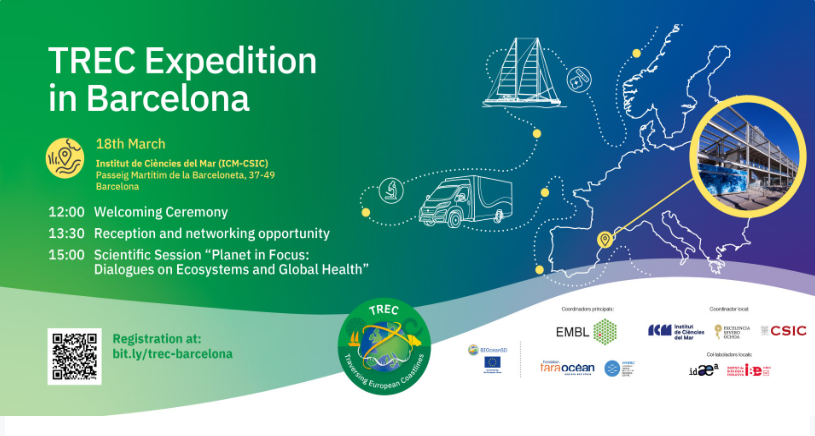IBE takes part in the ‘Traversing European Coastlines’ (TREC) expedition stop in Barcelona
The Institute of Evolutionary Biology (IBE) joins the TREC expedition during its stop in Barcelona. Spanning multiple European coastlines, the ‘Traversing European Coastlines’ (TREC) expedition partners with local Catalan institutions for Mediterranean research, with the aim of understanding and addressing global environmental challenges.

The 'Traversing European Coastlines' (TREC) expedition, spanning eight months in 2023 along the Atlantic, Baltic, and North Sea, now shifts its focus to the Mediterranean in 2024. Led by the European Molecular Biology Laboratory (EMBL) and partnering with the Tara Ocean Foundation, Tara Oceans Consortium, and European Marine Biology Resource Centre (EMBRC), TREC is a groundbreaking continent-wide endeavor. With over 150 research teams from 21 European countries, TREC aims to deepen our understanding of coastal ecosystems' responses to natural and human-made challenges by sampling along the entire European coast.
During its next stop in Barcelona, the Institute of Evolutionary Biology (IBE:CSIC-UPF) will participate in the TREC project together with other local institutions, like ICM-CSIC and IDAEA-CSIC. Their involvement signifies a commitment to advancing scientific knowledge and conservation efforts. The IBE brings state-of-the-art equipment and expertise to the project, focusing on various aspects of marine ecology and evolution. Motivated by the urgent need to address nature and human-induced impacts on coastal biodiversity, the IBE's participation underscores the importance of collaborative research in tackling complex environmental issues.
Specifically, within the TREC initiative, the IBE contributes through two laboratories. The Microbial Ecology and Evolution Laboratory Lab of IBE, led by Javier del Campo, will interact with TREC using their state-of-the-art equipment to improve our knowledge of the composition and structure of the coral holobiont. “We will use the TREC truck's imaging equipment to test novel methodologies on some of our favorite corals”, comments del Campo.
Additionally, the Biology and Ecology of Abundant Protists Lab of IBE, led by Daniel Richter, will participate in the TREC project by preparing samples of abundant, poorly characterized protist species, which will be treated in the TREC truck for subsequent imaging by both electron and fluorescence microscopy.
Both teams and also the IBE Communication Unit will also contribute to the outreach and sampling activities as volunteers during TREC’s visit to Barcelona. Through their participation, the IBE aims to facilitate scientific advancements while promoting public outreach and awareness of the critical importance of preserving coastal ecosystems.
On the other hand, Ricard Solé, principal investigator at the IBE in the Complex Systems Lab, will participate in the scientific event on March 18th during the session "Planet in Focus: Dialogues on Ecosystems and Global Health" with the talk 'Tackling ecosystem tipping points with emergent bioengineering'.
Joana Krause, predoctoral researcher from the Microbial Ecology and Evolution, Àlex Galvez, predoctoral researcher and Adrià Auladell, postdoctoral researcher, both from the Biology and Ecology of Abundant Protists Lab, will be involved in the following activities:
Guided tour of the EMBL Advanced Mobile Lab
Ever heard of a lab on wheels? Come and visit our mobile laboratory, which travels along the European coast studying local biodiversity. In this laboratory, you'll find state-of-the-art technology that is making current scientific research possible. Meet the scientists, try out their favorite equipment, and experiment yourself! Please note that access to the laboratory is only available via stairs.
Guided tour of the Institute of Evolutionary Biology (IBE: CSIC-UPF)
The Institute of Evolutionary Biology (IBE) is dedicated to understanding the evolutionary mechanisms that generate and maintain biodiversity, with the potential to drive strategies for species conservation. The IBE serves society, with the ultimate goal of promoting planetary well-being through its cutting-edge research and informing citizens about its scientific advancements towards this global objective. During this visit, you will learn about IBE's research from its research staff.
NEXUS ISLAND
Ecosystems are vital units comprising organisms and their environment. Understanding their complex dynamics is crucial for their preservation. "Nexus Island" guides students through a playful approach, delving into the role of biodiversity and the vulnerability of microorganisms to environmental changes. Through the activity, the role of research is highlighted in taking future actions related to ecosystem conservation.
More information here: https://www.embl.org/ells/teachingbase/nexus-island/

More about TREC: The scientific expedition
The aim of the project is to study the biodiversity and ecosystems on land and at sea, as well as the interactions of organisms with each other and with the environment. The scientific teams collect information on factors such as the presence of pollutants, antibiotics, pesticides, or hormones, as well as temperature, salinity, and oxygen levels. At each point where the team sample soil, sediments, and shallow water, the schooner Tara samples the associated marine ecosystems – on the same day and in the immediate vicinity.
Biological samples are fragile: as soon as a drop of water or crumb of soil is removed from its natural environment, the organisms within them begin to change. To maximise the integrity of organisms and to study them in the context of their natural environment, TREC is bringing the lab to the samples, instead of samples to the lab. In total, TREC will examine the biodiversity and molecular adaptability of life at the molecular scale at 120 coastal sampling sites across 21 European countries.
The pan-European nature of this project means that samples will be taken in a standardized fashion. This will make it possible to compare and probe data across Europe instead of a regional or national system in a way that was not previously possible.
Link to website: https://www.embl.org/about/info/trec/
